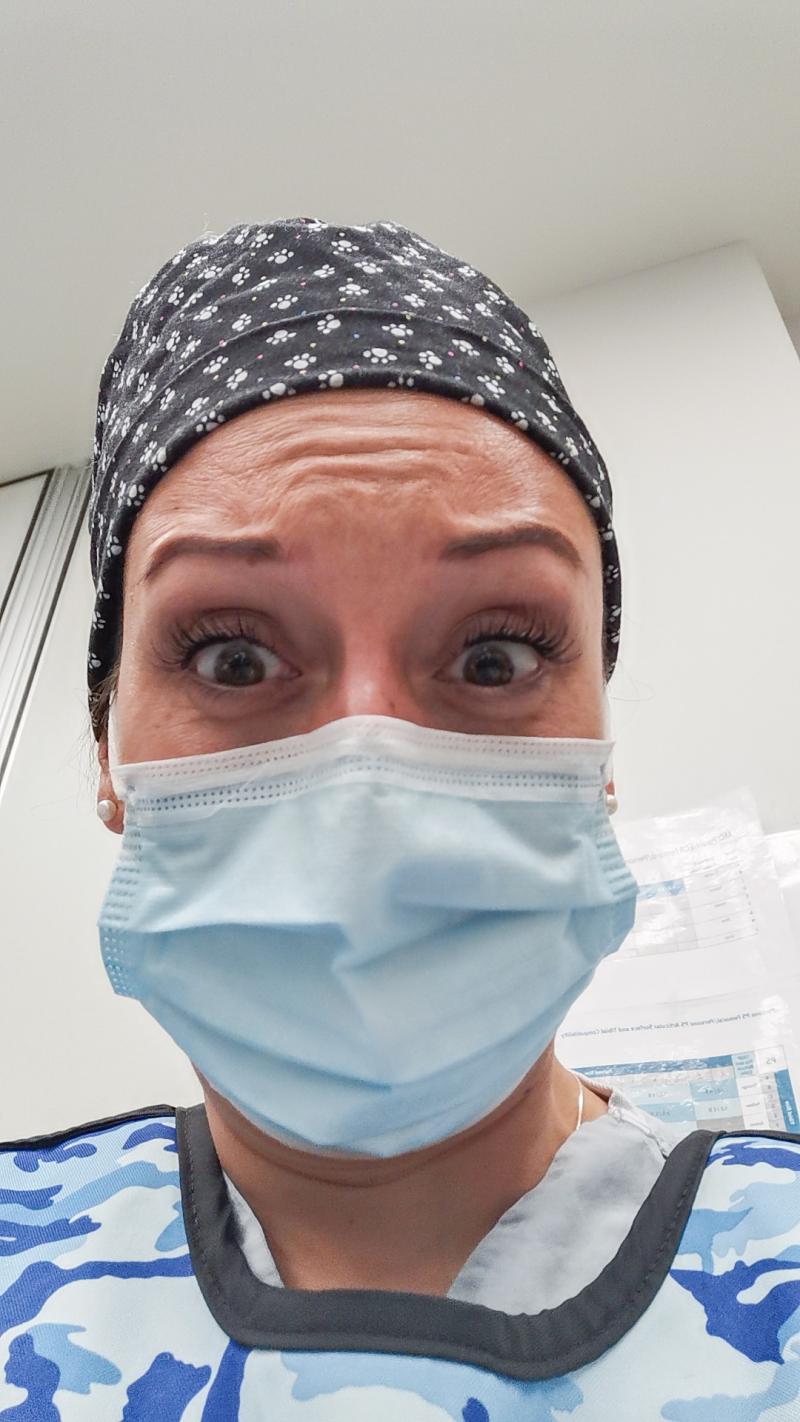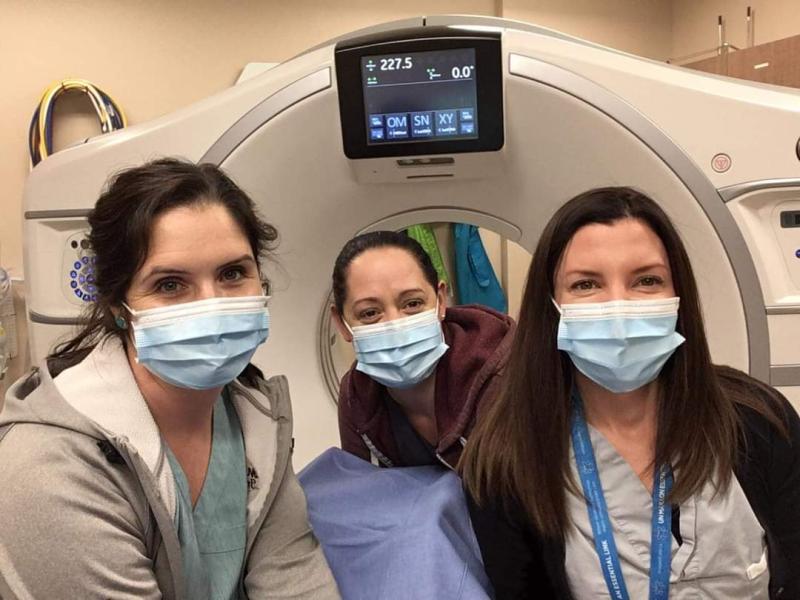Caitlin Thompson Career Spotlight
What area of health-care do you work in? Where do you work?
"I am a Medical Radiation Technologist (MRT) with my certificate in Computed Tomography (CT). I have been in this profession for almost eight years now and I currently work at the Victoria Hospital in Prince Albert."
What are you responsible for as a Medical Radiation Technologist. Describe a typical day.
"MRTs are health-care professionals and as such we have a wide variety of responsibilities. We uphold all our patient’s privacy and dignity and maintain accurate records of patient exams. It is also important for MRTs to encourage open communication and positive relationships with associated cohorts (ie. surgeons, physicians, nurses and administrative personnel). Some of the everyday duties as an MRT include performing general x-ray exams and fluoroscopy procedures. You may be scheduled in the Operating Room (OR) where you would work alongside orthopedic surgeons, urologists, nurses and anesthesiologists. Depending on your job position, you could also be working in CT performing routine scans or doing procedures with radiologists such as percutaneous drain insertions, chest tube insertions, biopsies or ablations which may also involve certain drug administration."
How is your work-life balance as an Medical Radiation Technologist? Please compare your current experience with other jobs you have had in the past.
"I work in a hospital setting, so my job involves shift work. We have staff on 24hrs a day, seven days a week. As MRTs, we are required to work day shifts, evenings, as well as night shifts, and be on-call. Honestly, these types of shifts can be tricky to manage some days. We all have appointments during the week or family obligations on weekends and evenings. Work can sometimes get in the way of those things but other times, it can also more easily facilitate them. Having weekdays off makes it much easier to accommodate those appointments that can only happen during “regular” business hours (typically 9:00am - 5:00pm).
I have worked in a few different settings, from a small clinic to hospitals in smaller and larger cities. Working in a somewhat larger facility like a hospital with a higher number of staff, compared to a smaller setting, gives the opportunity to have more coverage for time off or trade shifts with each other. These opportunities help accommodate a healthier work-life balance. I had previously worked in a small clinic where I was the only technologist on staff for a while, which made it difficult to get time off for these types of things."
Have you always wanted to be an Medical Radiation Technologist? Tell us more about your career path.
"Honestly, I was never the person who came out of high school knowing what I wanted to do. When I graduated, I went into a financial career working at a bank. I held a few different positions there but after a while, I realized sitting at a desk or in an office wasn’t what I wanted for myself. I thought I wanted to do something in health-care but wasn’t sure what options were out there. I had and still have many family members who work in the health-care field. It was my grandfather that introduced me to my current career as an MRT. At the time, he worked in maintenance at the hospital. I had never heard of or thought about this job before he brought it up to me, having coffee at my kitchen table. I did a little research on it, and talked to an associate of the family who worked as an MRT at the time who eventually gave me a quick tour of the department. This small interaction solidified my decision. This is what I wanted to do.
Entry to this program was, and I believe still is very competitive. I had to upgrade a couple high school science classes before I was ready to apply. I put in the work and got the required grades. I applied at Sask Polytechnic in Saskatoon as well as the Northern Alberta Technical Institute (NAIT) in Edmonton and the Southern Alberta Institute of Technology (SAIT) Calgary. I had interviews with all three facilities and was accepted in Saskatoon. I started and completed my first didactic year of school there in 2013/14. In the fall of 2015, I relocated to Regina to complete my second year of school, my clinical portion. I graduated from the program in the fall of 2015 and started my career in Prince Albert at the Victoria Hospital before moving to Saskatoon and taking a job at a small clinic in Warman. I later moved on and took a job at St. Paul’s hospital. A little over a year ago, I returned to my hometown of Prince Albert to be closer to my family and start one of my own."
Are there opportunities to further your career as a Medical Radiation Technologist?
There are plenty of different job opportunities as an MRT. When you graduate from the program you are qualified to perform general radiography exams as well as portable x-rays and fluoroscopy procedures. From there you can take additional online courses and on the job training to expand into Computed Tomography (CT), Mammography and Angiography. If you become interested in the management aspect, there are opportunities to become promoted to different types of supervisors or managers. There are also application type jobs if that’s something you are or become interested in. You can become a part of the team that helps with the computer applications used for vital, everyday functions as an MRT. Education is another avenue you could take with your career. If you have a passion for teaching, you can become an instructor in the program.
Do you have any advice for students or new graduates looking to pursue a career as a Medical Radiation Technologist?
To the students currently in the program, I know it’s tough. It’s a very demanding program and requires a lot from you in the two years you’re in it. Keep at it, you will get to the end. At the end of those two years, you’ll wonder where the time went. You will meet lots of great people and create new and strong friendships. If you’re as lucky as I was, you’ll even get to work alongside them when you’re finished. There are so many job opportunities out there right now. Don’t be afraid to specialize, or try something out of your comfort zone, as a new graduate or otherwise.
What is the number one thing you love about being a Medical Radiation Technologist?
I think too many people go to a job they don’t really enjoy, they do it for the paycheque. We spend so much of our lives at our jobs. I think it’s so important to enjoy what you do. I can say honestly that I love the career I chose and the team I work with. It would be very difficult to narrow it down to one single thing I love most about my job so I’m going to name a few. Specifically, to my job at the hospital, I enjoy the diversity and challenge that comes with it. We see all sorts of different patients come through, from patients sent from clinics to those coming in through the Emergency Room (ER) for severe injuries and illnesses. We help people of all ages, from new babies in the Neonatal Intensive Care Unit (NICU) to geriatric patients. Not everyone is able to do what we require, so we need to be able to modify how we do something to successfully perform the exam. Day to day, even throughout a single day, you can be doing completely different jobs, working in the OR to doing Mammograms or CTs.
Another thing I love about my job, which isn’t only linked to being an MRT, are the friendships I have formed. I work in a very close department and am so grateful for it. We aren’t just coworkers. We’re friends, and close ones at that. We are there for each other for support in and out of the workplace. We have Christmas parties and attend each others’ weddings and baby showers and organize group activities like our annual waterslide days and music bingo nights. I guess if I REALLY had to pick, that would be the number one thing I love about my job."




